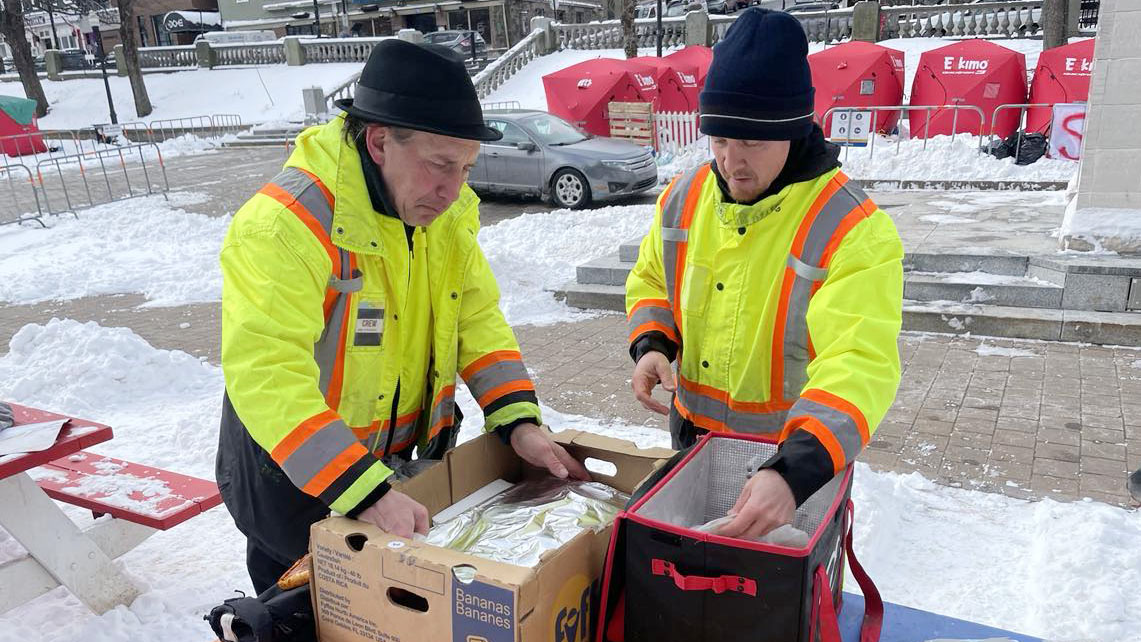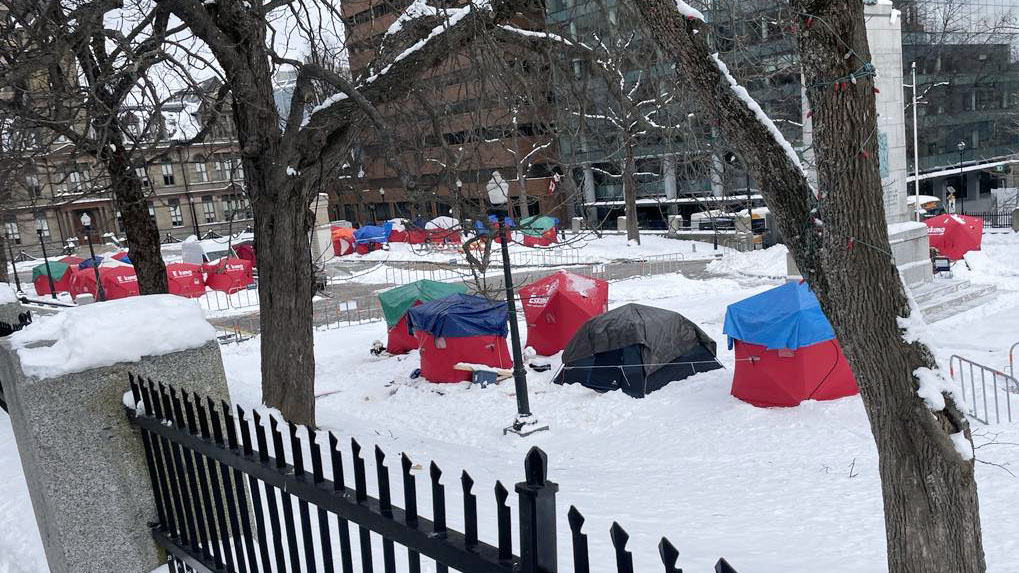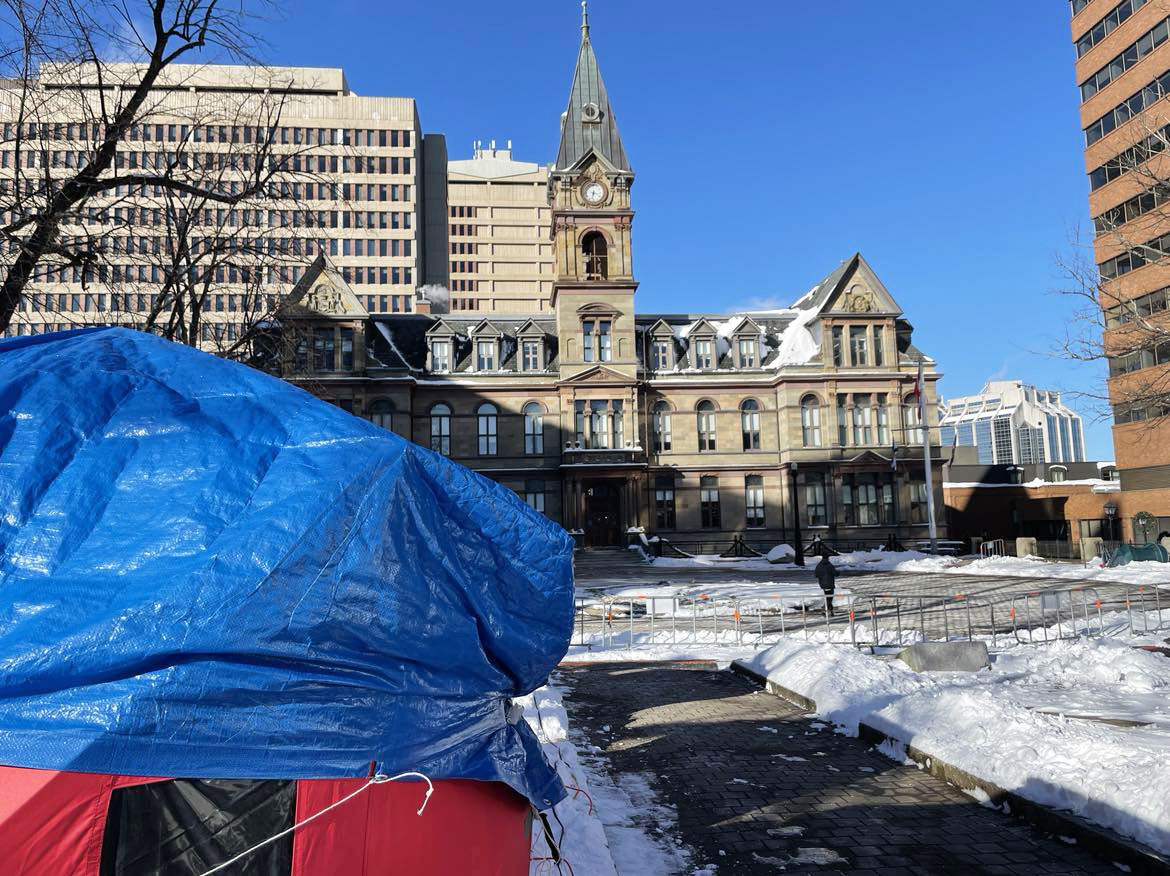The king of the Grand Parade

caption
Stephen Wilsack, left, and Matthew Grant unpack supplies in the Grand Parade homeless encampment.Meet Stephen Wilsack, who left his home to live in – and lead – Halifax’s most prominent tent encampment
A man stands alone in the dark, bracing against an icy wind that threatens to knock him over. Flashlight in one hand, he clears snow off a breaker panel and tries to make sense of the tangle of wires. The man is Stephen Wilsack. Late at night in the Grand Parade homeless encampment he is trying to restore power to a section of the camp. During the snowstorm a resident tried to use a coffee machine and blew a fuse. For those who have now lost electric heat, the situation is dire.
Wilsack is not homeless. He’s a volunteer, sacrificing the modern comforts of his home in Wolfville to help the residents of the encampment endure icy cold in the dead of winter.
‘Gotham City’
The day after the storm was beautiful, with sunshine and warmer weather meaning everyone was often outside. A care package of hot soup and sandwiches from a friend of Wilsack’s put the camp in a jovial atmosphere.
The Grand Parade encampment is its own tiny community, housing 20 to 30 people at a time. Wilsack has brought a lot of positive change here: improving shelters, bringing in electricity, even meeting with Mayor Mike Savage. But some things he cannot fix.
Stealing is a problem among the residents. Wilsack often is approached in the same manner a child might tell their parents about a sibling taking a toy. Anything of value must be kept close, and locks are essential when anyone goes away.
The residents of the Grand Parade are a mix of personalities. The working poor are here, because many can’t afford what little housing is available. The lifestyle of the unhoused is often uncertain and transient; some have been here for months, while others stay for a day or two before moving on. Other residents don’t work. Some of these are addicted to bad drugs.
In the daylight the residents congregate, laugh and share stories. With darkness, the true horrors of street life come alive. “It’s like Gotham City on its worst night,” says Wilsack. Trust is a commodity hard to come by, especially when drugs and alcohol are added to the mix.

caption
Wilsack arranged for the encampment to graduate from basic tents to insulated, heated ice fishing huts.Drug use is an epidemic facing unhoused people across the country. According to a 2020 survey in Vancouver, 73 percent of unhoused people used crack/cocaine and 52 percent used opioids.
Wilsack tried to tackle the problem of residents using money to buy drugs by handing out gift cards for Tim Hortons and McDonald’s. The plan did not work: these are now the unofficial currency of the camp. “Somewhere out there, there’s a drug dealer with a stack of gift cards a foot tall” one volunteer half-joked in a frustrated tone.
Wilsack says drug use is the most difficult part of his work, but he tries not to pass judgment. Addiction is difficult to overcome, especially in a high stress situation. A study by the Canadian government found that addiction or substance use increases by 10 percent after six months unhoused.
Every day at Halifax’s historic Grand Parade there is a new problem, from fires burning down tents to infighting among residents over mainly frivolous problems. There is an understanding that at any point something could go wrong. “It’s like each tent represents 20 different sticks of dynamite” Wilsack said. “At any moment it could explode, and we need to call 911.”
This is the daily struggle: eruptions of violence, mental health breaks and other commotions interrupt long periods of the mundane. In the end, most of the time is filled by people just trying to survive a Canadian winter while living in a tent.
The fire
At 8 a.m. on the morning of December 9, a resident comes running toward Stephen Wilsack, yelling “Fire fire fire!” Wilsack grabs a small fire extinguisher from a tent and a larger one he keeps in his van and runs towards the blaze. By now, smoke is billowing out of the tent from a hole burned in its side.
He empties the first extinguisher, then the second to no avail. Eventually resorting to a bucket of nearby rainwater, Wilsack starts to get the fire under control. In the commotion, three people manage to crawl from the smoldering tent. He believes they had been smoking crack.
The fire department arrives quickly and puts an end to the blaze. Picking through the smoldering wreckage of the tent, a 20L propane tank was discovered inside. Had the fire been any worse, the tank could have exploded – killing everyone around it.
The cause of the fire remains undetermined. The presence of the tank, meanwhile, is a grim reminder of the risk of propane heat. In response to the fire, Dave Slaunwhite of the Halifax Fire Dept. publicly cautioned against the use of propane heaters in tents.
The long day
Wilsack’s mornings start at sunrise, with checkups, hot coffee and cold pastries shared with anyone who asks. He appears to be easygoing, but is relentless in his work. Much of his day consists of wellness checks with the residents, asking about their situation and how they are feeling. Often this means just listening to the same story over and over again. “It’s nice for them to just be heard,” he says.
Wilsack is easily recognized by the bright yellow high vis coat he always wears. This is his unofficial uniform, making him easy to spot in case of an emergency. Even without the coat, Wilsack stands out without effort. He wears a black fedora with a colourful feather tucked on the side, his greying brown hair in a ponytail underneath.
A Nova Scotia native, he normally works in the film industry as an assistant director and production health and safety officer, a job that has taken him all over the world. He first encountered the Grand Parade encampment while in Halifax working on a Hallmark movie set.
Wilsack comes across as inviting and compassionate; his piercing blue eyes and the wrinkles on his face tell the story of a man who has lived a long and interesting life. In the Grand Parade he speaks in a humorous but sarcastic tone, an attempt to make light of a seemingly hopeless situation.
While taking the stance of a humble civil servant, Wilsack naturally assumes the role of community leader. Other volunteers try their best to keep up with his compassionate example, something that provides him with a great sense of pride.
Wilsack is quick to deflect questions about himself into an opportunity for someone less fortunate to share their story. This comes across as either humility or a shroud of mystery. He once said, “I don’t care about being famous, I simply want to get people inside.”
Perhaps the most astonishing thing about him is that on November 18, 2023, Stephen Wilsack started living alongside the unhoused in the Grand Parade encampment. He spends his nights inside his sprinter van, with personal security and a walled compound.
From the moment he got there, he felt he had to stay. “It’s like seeing a baby crying on the street, he said. “You can’t just walk past it.”
He is critical of the lack of government spending on homelessness, but faces financial criticism online himself. His GoFundMe page has raised almost $70,000, and he has not published statements showing how the money is being spent. Online critics raise questions about transparency; Wilsack feels that his actions speak for themselves.
The operation has become so large that a section of the encampment was converted into a makeshift compound of six storage tents, along with one for Wilsack’s personal use. This seven-tent section is secured by a wall constructed of metal walking barriers and various items found in the park. As an added safety measure, a security guard – hired by Wilsack and paid from the GoFundMe trust – ensures 24/7 protection.
If one could live in luxury while being homeless, this is it.

caption
The Grand Parade homeless encampment was next to Halifax City Hall.Sleep On It
Starting with a simple goal – to get people who are sleeping outside off the ground – Wilsack began wrapping foam mattresses in garbage bags to make them waterproof. He initially targeted Victoria Park, but threats of violence from the more territorial residents inspired a location change. At the Grand Parade, more people were receptive to his help.
It became clear to Wilsack that a mattress would simply not be sufficient. The situation even in November was dire. Many residents feared that some of them would die before winter was over.
He recruited the help of his friend Matthew Grant, who quickly became instrumental to the project. Passionate and dedicated, Grant decided to quit his job with a security company to help out full-time. He feels that this work is the most important thing he has even done.
Two weeks after they arrived, Wilsack started a GoFundMe page – he calls the project Sleep On It – to help pay for the rising costs. He believes that most people see what is happening and want to help, but don’t know how. Donations, he felt, were a great way to do that.
Many of the residents hold Wilsack in high regard. One man, Bruno, a construction worker, came to Wilsack in the hope of getting a tent for the night. Not wanting to turn him away and without any tents available, Wilsack cleaned out a storage tent and gave him some blankets.
Having walls and a roof means the world to Bruno. The smallest degree of stability in his life allowed him to stop worrying about survival and to look a little further ahead. He saved up enough to afford a used Grand Caravan that he now calls home.
Three months after Wilsack’s arrival, the Grand Parade had transformed from a desperate situation into something close to sustainable. The camp had evolved from a collection of summer tents into 30 Eskimo brand pop-up ice fishing huts, much more suitable for winter.
Purchased with the GoFundMe money, he negotiated bulk orders of fishing huts with the company, not only for the Grand Parade but for other encampments on the East Coast.
Each one is 36 square feet. Most have an extra tarp for added protection from rain. Each is equipped with heat and electricity, and almost every day a hot meal is brought in by volunteers.
Homeless people from other parts of the city refer to the residents of the Grand Parade encampment as privileged. This sentiment sometimes sparks altercations between residents and outsiders. But Wilsack want his example replicated, not envied.
The fundamental needs for survival – food, shelter and warmth – provide residents with more of what it means to be human: privacy, stability, and dignity.
The notice
On February 7, 2024, residents of the Grand Parade encampment awoke to an eviction notice zip tied to each of their tents. The notice informed residents that the city had declared they are no longer allowed to camp in the park and must leave by February 26, or will be removed.
The atmosphere of the encampment that day was tense and uneasy, more than usual. Everyone was taking the uncertainty about their future in their own way. There was a lot of anger.
Wilsack took to social media to voice his disgust with the city. But the opening of the Halifax Forum shelter means there is another option for those in the encampment; therefore occupants can be legally removed.
City officials cite the danger that encampments pose to the community and to residents themselves as one reason to shut them down. Fires such as the one that Wilsack handled, and mental health emergencies, are a burden on emergency services, something that the city hopes improves with shelters.
Those in the encampment talk of the shelters with disdain. They feel they resemble prisons and take away their privacy.
Since the notice, though, the tents in the camp have started to disappear. Some people found an apartment to go to; some found another arrangement. Others agreed to enter a drug treatment program. Still others plan to pitch their tent somewhere else.
For Wilsack, the closing of the Grand Parade does not mean that the work is finished. He believes his model should be replicated all over, and says he will continue to help however he can.
Wilsack agreed to this profile in the hopes of inspiring others to act. Winding up sleeping in a tent, he said, “could be any one of us at any given time.”
About the author
Ben Harris
...
